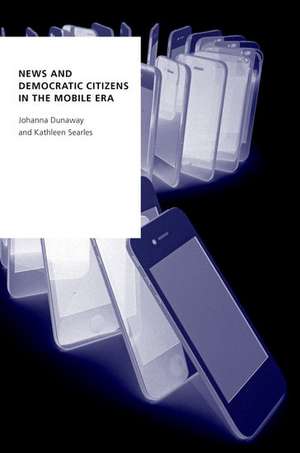News and Democratic Citizens in the Mobile Era: OXFORD STUDIES DIGITAL POLITICS SERIES
Autor Johanna Dunaway, Kathleen Searlesen Limba Engleză Paperback – 21 dec 2022
Preț: 139.01 lei
Preț vechi: 153.49 lei
-9% Nou
Puncte Express: 209
Preț estimativ în valută:
26.61€ • 28.91$ • 22.37£
26.61€ • 28.91$ • 22.37£
Carte disponibilă
Livrare economică 20-26 martie
Preluare comenzi: 021 569.72.76
Specificații
ISBN-13: 9780190922498
ISBN-10: 0190922494
Pagini: 176
Dimensiuni: 237 x 157 x 12 mm
Greutate: 0.27 kg
Editura: Oxford University Press
Colecția OUP USA
Seria OXFORD STUDIES DIGITAL POLITICS SERIES
Locul publicării:New York, United States
ISBN-10: 0190922494
Pagini: 176
Dimensiuni: 237 x 157 x 12 mm
Greutate: 0.27 kg
Editura: Oxford University Press
Colecția OUP USA
Seria OXFORD STUDIES DIGITAL POLITICS SERIES
Locul publicării:New York, United States
Recenzii
Dunaway and Searles' new book is a must read for anyone seeking to know how the public understands politics as news consumption increasingly moves to small screens and mobile devices. Drawing on convergent psycho-physiological measures, they find that while there is broader physical access to news, people pay less attention, are less cognitively engaged, and learn less. Their post exposure processing (PEP) theory extends theories of media effects beyond persuasion to reveal the important role that individuals' uses of new technologies are playing in these polarized times.
There are many layers of technological, institutional, and economic change that matter to our understanding of how citizens process the news; and, as Dunaway and Searles show, even the device we use to access news matters quite a bit. This book is the most comprehensive assessment yet of how and why this matters. Melding a genuinely useful theoretical framework with robust empirical work, Dunaway and Searles have made a vital contribution to our understanding of the democratic implications of the continuing migration of news consumption to mobile devices. The results, it should be noted, add to the growing list of reasons why we should be concerned about the future of an informed citizenry.
Content matters, but so does how we access content. In this important book, Dunaway and Searles use multiple research designs—including physiological measurement—to understand news attention and learning on different devices. People process news differently on mobile phones than on computers, and it matters for democracy.
There are many layers of technological, institutional, and economic change that matter to our understanding of how citizens process the news; and, as Dunaway and Searles show, even the device we use to access news matters quite a bit. This book is the most comprehensive assessment yet of how and why this matters. Melding a genuinely useful theoretical framework with robust empirical work, Dunaway and Searles have made a vital contribution to our understanding of the democratic implications of the continuing migration of news consumption to mobile devices. The results, it should be noted, add to the growing list of reasons why we should be concerned about the future of an informed citizenry.
Content matters, but so does how we access content. In this important book, Dunaway and Searles use multiple research designs—including physiological measurement—to understand news attention and learning on different devices. People process news differently on mobile phones than on computers, and it matters for democracy.
Notă biografică
Johanna Dunaway is Associate Professor of Political Science at Texas A&M University.Kathleen Searles is Associate Professor of Mass Communication and Political Science at Louisiana State University.


